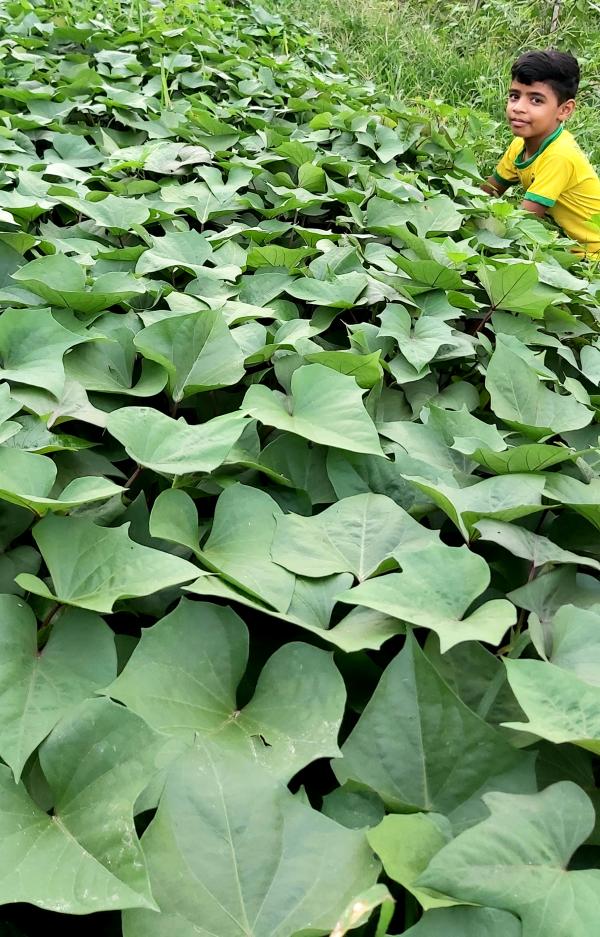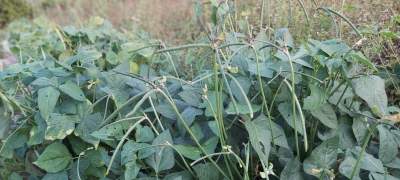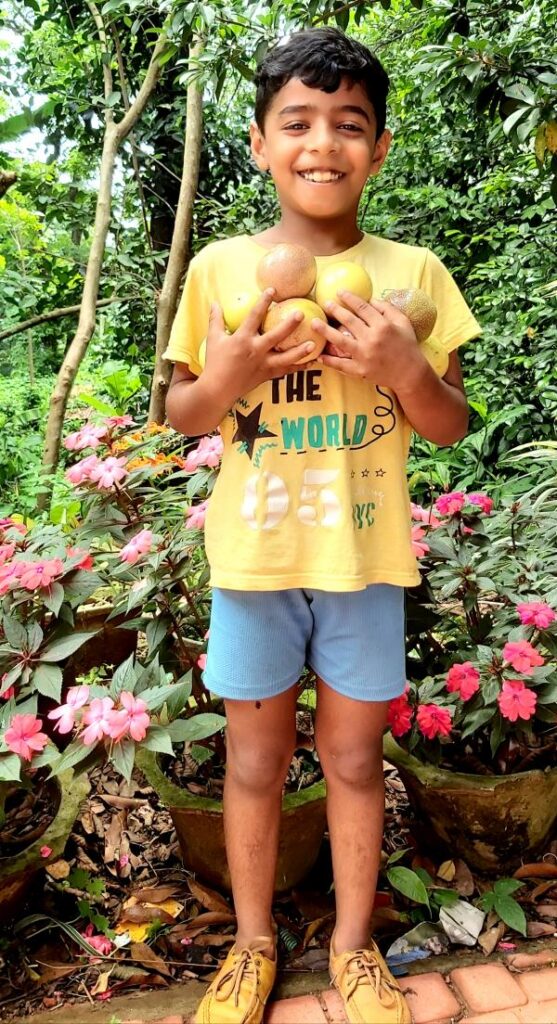
Kalaripayattu Farm
The Kalaripayattu school is situated on a three and a half acre farm. Almost everything that is grown here ends up on on the table, ready to be eaten by Thomas’ family and his Kalari students. Almost every inch of the land, apart from where the Kalari stands, is used to produce food in the form of fruit and vegetables. Several varieties of medicinal herbs are also grown here.
Vegetables on the Farm (Kalaripayattu Warrior Fuel)

All year round one can expect to see home grown, hand picked veg on the dinner table. Down in the lush fields at the bottom of the hill lies the well stocked and expertly tended kitchen garden. Long runner beans dangle from their vines next to a patch of stout, plump cabbages. Shiny purple aubergines swing on the breeze waiting to be plucked and turned into delicious pickled chutney. Yams tunnel into the fertile ground next to ordered ranks of leafy tapioca that stand firmly to attention. As well as these spinach and bitter gourd grow among the other flourishing vegetables.

Fruit and Spices
The spices are more seasonal and so slightly less abundant but just as varied. A huge selection of fruit also grows on the land, dotted around the area in random locations from the front of the house down to the walls of the Kalari and further still into the fields.





Fig fruit 
Milo with Pomelo 
Adwaid with Passion fruit 
January to March
January marks the time when the coffee beans turn from green to bright red, ready to be picked and sent to the refinery in exchange for fresh ground coffee. During this time ginger, cloves and black peppercorns may be plucked from the herb garden to be used in the cooking pot. Juicy chikoos hang from the trees in front of the house and the last of the swollen yellow grapefruits bounce on their sagging branches next to the Kalari.
April to June
As the year progresses and the temperature rises the main selection of fruit becomes available. Around April mangos grow and ripen around the horse paddock and the sugar cane in the field becomes ready for cutting – some to be made into jaggery, some just to be chewed on as a snack. Yellow jackfruits catch the eye high up amid the green of the forest. They become a staple of the diet here from April to August. As April moves on into May the guava tree above the fish pond bears succulent, ripe fruit.
Come June the tunnel leading to the Kalari, formed of sprawling green creepers and vines, sags under the weight of dark passion fruit baubles, sweet, juicy and delicious. Sour lemons – the main ingredient in Thomas Gurukkal’s mother’s home made lemonade – start to become ready for harvest around this time too.
July to December
In July the cocoa plants start producing hanging pods, full of cocoa beans. The pods are plucked then the beans are dried in the sun and sent to a chocolate factory. July also marks the time that the tropical rambutan becomes ready for harvest.
Moving back towards winter the herb garden yields some turmeric for the cooler months in October, and November brings in the ripening of the areca nuts in the palm grove at the bottom of the hill. The areca nut is not for eating but is sent away to be processed to make an ingredient in paan.
All Year Round
There are a number of fruit and spices that are available all year round. Papaya grows next to the Kalari, a fig tree constantly sprouts bulbous fruit next to the horse paddock and coconut trees hang over the house and the field. The coconuts are essential in a Keralan household, not only for snacking on but as key ingredients in most meals and for creating cooking oil. Eight types of banana produce tasty fruit all year round – some to be eaten straight away, some to be used in cooking and making banana chips. Spicy chilis, both green and red, grow in every month of the year, and nutmeg hangs from branches around the fields almost permanently.

Kalaripayattu Farm Livestock
As well as all of these plants, the farm also houses a number of animals. Chickens are kept for their fresh eggs and goats for their milk. A cow and a buffalo keep each other company next to where the fiery Marwari horse, Badri, grazes during the day. Two dogs, Rana and Lachu, faithfully keep guard over the whole estate. The loyal hounds fiercely protect the livestock of the farm (although the occasional chicken has been known to disappear under mysterious circumstances).










No Comments
Sorry, the comment form is closed at this time.